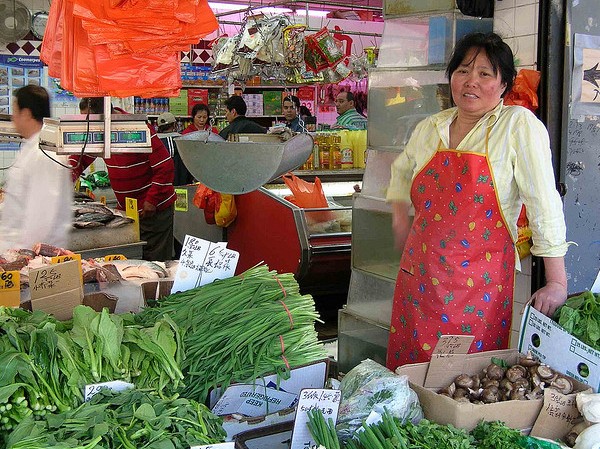The lone male remains the archetype of migrant labor, despite the changing facts on the ground.

June 12, 2012
It’s early morning in Chinatown, and men are lined up for milky coffee and sponge cake at Sun Light Bakery. A more leisurely set sits at the counter of Hop Shing, slurping congee flecked with brick-red pork and sipping from an ever-darkening well of tea.
Chinatown was once a bachelors’ society, a pulsing maze of narrow tenements and quick-stop eateries. Sepia photos of working Chinamen smell of brawn and sacrifice, loneliness, grime, and certain depredations. We’re inclined to forgive them the occasional brothel or high-stakes game on account of their massive dislocation. Men, after all, should be tended by wives and children, not left to their own devices.
The lone male remains the archetype of migrant labor, despite the changing facts on the ground. According to the International Labour Organization, women today constitute 50 percent of the world’s migrant breadwinners. Take a country like the Philippines, whose men famously built our railroads. The Filipino laborer of the early 20th century is now an Overseas Filipina Worker (OFW) in a caregiving field—a nurse, domestic worker, or home health aide. In New York City, she lives with roommates, distant relatives, or in a boarding house, scrimps to wire money home, and Skypes at night with her kids in Manila. Her remittances, added up around the world, constitute more than 10 percent of the Philippines economy (and even more in the cases of India, China and Mexico).
The OFW, like so many Asian immigrant women, belongs to a fractional family, split across the globe and immune to capture by the Census. In New York City, migrant workers comprise some of the nearly 101,000 Asians who live in non-familial households. Emigration is a familial calculus, according to scholars Alejandro Portes and Rubén Rumbaut: “Households frequently send a member abroad in order to generate sufficient income to ‘catch up’ with the levels of consumption and lifestyles that are already present and visible among others nearby.” And today, the member elected to go abroad is as likely to be a woman as a man.
Could the old-style bachelors’ society become one of bachelorettes? The alleys of Chinatown crammed, instead, with female tenants, roommates, and single room occupancy dwellers? It’s hard to imagine them crowding into bunks, throwing back shots, eating out of styrofoam, or seeking out a happy ending.
It’s different for migrant women. As dependents, we rely on their labor—in restaurants, office buildings, nail salons, laundries, and factories—but expect virtue and nurture, not just cash. Even abroad, they must dial in to a “second shift” at home, and we could never forgive lapses in their womanly prudence.



